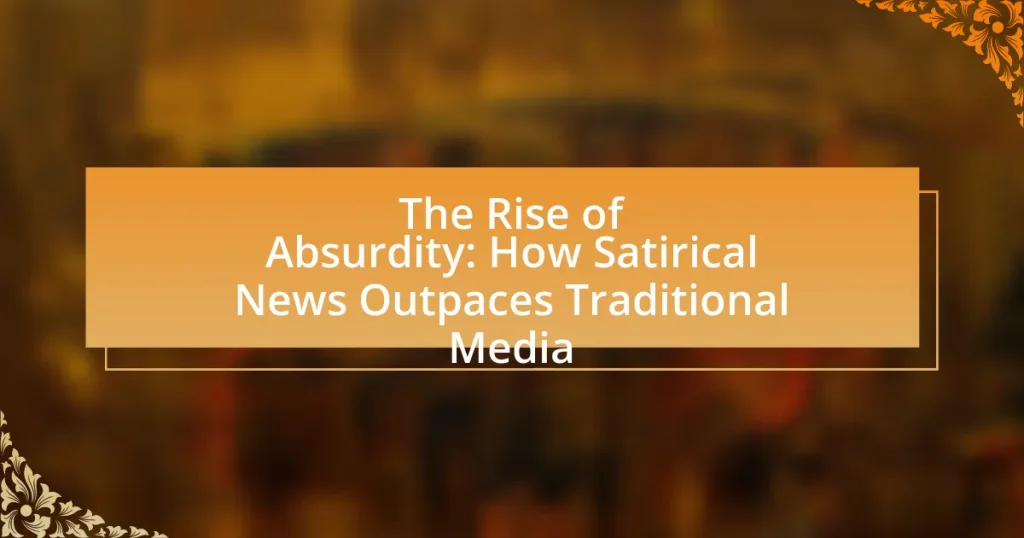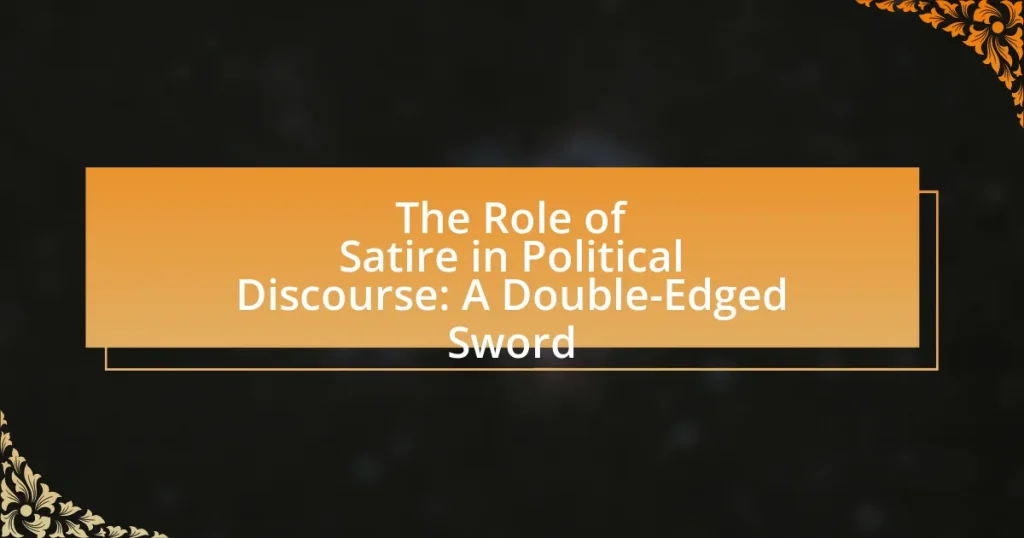Satirical podcasts have emerged as a significant force in modern comedy, blending humor with critical commentary on current events and societal issues. They have evolved from scripted formats to dynamic, interactive discussions, engaging audiences in ways traditional media often fails to achieve. Historical factors such as advancements in media technology and declining trust in mainstream journalism have contributed to their rise, while their unique approach to humor fosters political awareness and social critique. This article explores the impact of satirical podcasts on public discourse, their influence on political and social commentary, and the skills necessary for hosts to effectively engage listeners. Additionally, it examines emerging trends and challenges within the satirical podcasting landscape, providing insights for aspiring podcasters.

What is the impact of satirical podcasts on modern comedy?
Satirical podcasts significantly influence modern comedy by providing a platform for critical commentary on current events and societal issues. These podcasts often blend humor with political and social critique, allowing comedians to engage audiences in discussions that traditional media may overlook. For instance, shows like “The Daily Show” and “Pod Save America” have successfully used satire to shape public opinion and encourage political engagement, evidenced by increased voter turnout among their listeners during elections. This format not only entertains but also educates, making complex topics more accessible and relatable to a broader audience.
How have satirical podcasts evolved in the comedy landscape?
Satirical podcasts have evolved significantly in the comedy landscape by integrating real-time news commentary with humor, thereby enhancing their relevance and appeal. Initially, satirical podcasts primarily focused on scripted content, but they have shifted towards a more dynamic format that includes improvisation and audience interaction, reflecting current events and societal issues. This evolution is evidenced by the rise of popular shows like “The Daily Show” podcast and “Pod Save America,” which blend political satire with engaging discussions, attracting millions of listeners. Furthermore, the accessibility of podcasting platforms has democratized comedy, allowing diverse voices to contribute to the satirical discourse, thus broadening the genre’s reach and impact.
What historical factors contributed to the rise of satirical podcasts?
The rise of satirical podcasts can be attributed to several historical factors, including the evolution of media technology, the decline of traditional journalism, and the increasing public demand for alternative perspectives on current events. The advent of the internet and portable audio devices in the early 2000s allowed for easier access to podcasting platforms, enabling creators to produce and distribute content without the constraints of traditional media. Additionally, the decline of trust in mainstream news outlets, particularly following events like the 2003 Iraq War and the rise of “fake news,” led audiences to seek out satirical commentary as a means of understanding complex political landscapes. This shift was further fueled by the popularity of satirical television shows, such as “The Daily Show” and “Saturday Night Live,” which set a precedent for blending humor with political discourse, inspiring podcasters to adopt similar formats.
How do satirical podcasts differ from traditional comedy formats?
Satirical podcasts differ from traditional comedy formats primarily in their focus on social commentary and critique. While traditional comedy often emphasizes humor for entertainment without necessarily addressing current events or societal issues, satirical podcasts use humor as a tool to analyze and mock political, cultural, or social phenomena. For example, shows like “The Daily Show” and “Pod Save America” blend news with comedy, allowing listeners to engage with serious topics in a humorous context, which can enhance understanding and provoke thought. This approach not only entertains but also encourages critical thinking about real-world issues, distinguishing satirical podcasts from more conventional comedic formats that may prioritize jokes over substance.
What role do satirical podcasts play in shaping public discourse?
Satirical podcasts play a significant role in shaping public discourse by providing a platform for critical commentary on social and political issues. These podcasts often blend humor with analysis, making complex topics more accessible and engaging for listeners. For instance, shows like “The Daily Show” podcast and “Pod Save America” have successfully influenced public opinion by addressing current events through a satirical lens, encouraging listeners to think critically about the information presented in mainstream media. Research indicates that satire can enhance political engagement, as listeners are more likely to discuss and share content that resonates with them emotionally, thereby amplifying the reach and impact of the discourse.
How do satirical podcasts influence political and social commentary?
Satirical podcasts significantly influence political and social commentary by shaping public perception and encouraging critical thinking. These podcasts often use humor and satire to highlight societal issues, making complex topics more accessible and engaging for listeners. For instance, shows like “The Daily Show” and “Pod Save America” have been shown to increase political awareness and engagement among their audiences, as evidenced by studies indicating that listeners are more likely to discuss political issues and participate in civic activities after consuming satirical content. This influence is further amplified by the podcasts’ ability to reach diverse demographics, fostering a culture of informed discourse and challenging mainstream narratives.
What are the implications of satire in podcasting for audience perception?
Satire in podcasting significantly shapes audience perception by influencing their understanding of social and political issues. Through humor and exaggeration, satirical podcasts can challenge prevailing narratives, prompting listeners to critically evaluate their beliefs and the information presented to them. For instance, research indicates that audiences exposed to satirical content often demonstrate increased political awareness and engagement, as seen in studies like “The Effects of Satire on Political Attitudes” by researchers at the University of Pennsylvania, which found that satirical programming can enhance audience skepticism towards traditional news sources. This suggests that satire not only entertains but also serves as a catalyst for deeper reflection and discourse among listeners.
Why are satirical podcasts popular among modern audiences?
Satirical podcasts are popular among modern audiences because they provide a humorous lens through which to critique societal issues and current events. This format allows listeners to engage with complex topics in an entertaining way, making difficult subjects more accessible. According to a 2021 study by the Pew Research Center, 44% of podcast listeners enjoy content that offers a comedic take on news, indicating a strong preference for humor in media consumption. Additionally, the interactive nature of podcasts fosters a sense of community among listeners, who often share and discuss episodes, further enhancing their appeal.
What demographic trends are evident in the listenership of satirical podcasts?
The listenership of satirical podcasts predominantly consists of younger audiences, particularly those aged 18 to 34. This demographic trend is supported by research indicating that 54% of podcast listeners fall within this age range, with a significant portion identifying as liberal or progressive, which aligns with the often politically charged content of satirical podcasts. Additionally, studies show that satirical podcast listeners are more likely to be educated, with a higher percentage holding college degrees compared to the general population. This trend reflects the appeal of satirical content among individuals who seek critical perspectives on current events and social issues.
How do satirical podcasts engage listeners differently than other media?
Satirical podcasts engage listeners differently than other media by utilizing humor and irony to critique societal issues, fostering a unique connection through shared laughter and reflection. This format allows for a more intimate and personal experience, as listeners can consume content at their own pace and often feel a sense of community with hosts and fellow listeners. Research indicates that humor enhances retention of information, making satirical podcasts effective in conveying complex topics, as evidenced by studies showing that audiences are more likely to remember messages delivered in a humorous context.

What are the key elements of successful satirical podcasts?
Successful satirical podcasts incorporate sharp wit, relevant cultural commentary, and engaging storytelling. Sharp wit allows hosts to deliver humor that resonates with listeners, while relevant cultural commentary ensures that the content reflects current events and societal issues, making it relatable. Engaging storytelling captivates the audience, drawing them into the narrative and enhancing the comedic impact. Research indicates that podcasts with a strong connection to contemporary topics tend to attract larger audiences, as they foster a sense of community and shared understanding among listeners.
How do hosts and guests contribute to the effectiveness of satirical podcasts?
Hosts and guests significantly enhance the effectiveness of satirical podcasts by providing diverse perspectives and engaging dialogue that resonate with audiences. Hosts typically set the tone and direction of the podcast, utilizing their comedic timing and knowledge to craft narratives that critique societal issues. For instance, a study by the Pew Research Center found that humor can effectively engage listeners on complex topics, making them more receptive to critical commentary. Guests, often experts or comedians, introduce fresh viewpoints and anecdotes that enrich the discussion, fostering a dynamic interplay that keeps the content lively and relatable. This combination of a strong host and insightful guests creates a compelling listening experience that not only entertains but also provokes thought, thereby amplifying the podcast’s impact on modern comedy.
What skills are essential for hosts of satirical podcasts?
Hosts of satirical podcasts must possess strong communication skills, critical thinking, and a deep understanding of current events and cultural issues. Effective communication allows hosts to convey humor and satire clearly, while critical thinking enables them to analyze and critique societal norms and political situations. A comprehensive grasp of current events ensures that the content remains relevant and engaging, as evidenced by the success of podcasts like “The Daily Show” and “Last Week Tonight,” which thrive on timely commentary. These skills collectively enhance the host’s ability to connect with the audience and deliver impactful satire.
How do guest appearances enhance the comedic value of these podcasts?
Guest appearances enhance the comedic value of podcasts by introducing diverse perspectives and unique comedic styles that can create unexpected humor. When a guest with a distinct background or comedic approach joins the host, it often leads to spontaneous interactions and banter that can elevate the overall entertainment level. For instance, podcasts like “Comedy Bang! Bang!” frequently feature guests from various entertainment sectors, resulting in fresh comedic dynamics that engage listeners. This variety not only keeps the content lively but also allows for the exploration of different comedic techniques, making the humor more relatable and multifaceted.
What techniques do satirical podcasts use to deliver humor?
Satirical podcasts use techniques such as exaggeration, irony, parody, and absurdity to deliver humor. Exaggeration amplifies real-life situations to highlight their ridiculousness, while irony contrasts expectations with reality, creating comedic tension. Parody mimics the style of other media or public figures to critique them, and absurdity introduces nonsensical elements that challenge logical reasoning, making the humor more impactful. These techniques are effective because they resonate with audiences familiar with the subjects being satirized, allowing for a deeper connection and understanding of the humor presented.
How does timing and delivery affect the impact of satire in podcasts?
Timing and delivery significantly enhance the impact of satire in podcasts by shaping audience perception and engagement. Effective timing, such as the strategic placement of punchlines or pauses, allows listeners to absorb the humor and context, making the satire more resonant. For instance, a study by the University of California found that comedic timing can increase audience laughter by up to 50%, demonstrating its crucial role in humor delivery. Additionally, the delivery style, including tone and pacing, influences how the satire is received; a rapid-fire delivery can create a sense of urgency and excitement, while a slower, more deliberate approach can emphasize the absurdity of the satire. This interplay between timing and delivery ultimately determines how effectively the satire critiques societal norms and engages listeners, reinforcing the podcast’s comedic impact.
What role does sound design play in enhancing comedic elements?
Sound design plays a crucial role in enhancing comedic elements by using auditory cues to amplify humor and timing. Effective sound design incorporates elements such as sound effects, music, and silence to create comedic tension and release, which can significantly influence audience reactions. For instance, the use of exaggerated sound effects, like a cartoonish slip or a dramatic sting, can heighten the absurdity of a situation, making it funnier. Research indicates that well-timed audio cues can improve comedic timing, as evidenced by studies showing that audiences respond more positively to jokes accompanied by appropriate sound effects compared to those without. This demonstrates that sound design is not merely an accessory but a fundamental component in crafting effective comedic narratives in satirical podcasts.

How do satirical podcasts influence the future of comedy?
Satirical podcasts significantly influence the future of comedy by shaping public discourse and providing a platform for diverse comedic voices. These podcasts often blend humor with critical commentary on current events, which not only entertains but also engages listeners in social and political issues. For instance, shows like “The Daily Show” and “Pod Save America” have demonstrated that satire can effectively address serious topics, making them more accessible and relatable to audiences. This trend encourages emerging comedians to adopt similar formats, fostering a new generation of humor that prioritizes relevance and social commentary. As a result, the landscape of comedy is evolving to include more interactive and participatory elements, reflecting the changing dynamics of media consumption and audience engagement.
What trends are emerging in the satirical podcasting space?
Emerging trends in the satirical podcasting space include the rise of niche content targeting specific audiences, increased use of interactive formats, and the integration of social media for real-time engagement. Niche content allows creators to cater to particular interests, enhancing listener loyalty; for example, podcasts focusing on political satire or cultural commentary have gained substantial followings. Interactive formats, such as live recordings and audience participation, foster a sense of community and immediacy, which has been shown to increase listener engagement. Additionally, the integration of social media platforms enables hosts to interact with their audience during episodes, creating a dynamic feedback loop that enhances the overall experience. These trends reflect the evolving landscape of comedy and media consumption, driven by audience preferences for personalized and participatory content.
How are new technologies shaping the production of satirical podcasts?
New technologies are significantly shaping the production of satirical podcasts by enhancing accessibility, improving audio quality, and enabling innovative content creation. For instance, advancements in recording equipment and editing software allow creators to produce high-quality audio with minimal investment, democratizing the podcasting landscape. Additionally, platforms like Anchor and Podbean streamline distribution and monetization, making it easier for satirical content creators to reach wider audiences. According to a report by Edison Research, the number of podcast listeners in the U.S. has grown to over 100 million, indicating a robust demand for diverse content, including satire. This growth is further supported by social media integration, which facilitates audience engagement and feedback, allowing creators to adapt their content in real-time based on listener preferences.
What potential challenges do satirical podcasts face in the evolving media landscape?
Satirical podcasts face several potential challenges in the evolving media landscape, including increased competition, audience fragmentation, and the risk of misinterpretation. Increased competition arises from the growing number of podcasts available, making it difficult for satirical content to stand out. Audience fragmentation occurs as listeners have diverse preferences, leading to a dilution of a unified audience base. Additionally, the risk of misinterpretation is significant; satire can be easily misunderstood, especially in a polarized environment where audiences may take content literally rather than as intended humor. These challenges are compounded by the rapid pace of social media, where reactions can be instantaneous and often harsh, impacting the reputation and reach of satirical podcasts.
What can aspiring podcasters learn from successful satirical podcasts?
Aspiring podcasters can learn the importance of sharp wit and cultural relevance from successful satirical podcasts. These podcasts often utilize humor to address current events and societal issues, making complex topics more accessible and engaging for listeners. For instance, shows like “The Daily Show” and “Last Week Tonight with John Oliver” have demonstrated that blending comedy with journalism can attract a large audience while fostering critical thinking. This approach not only entertains but also encourages listeners to reflect on important issues, showcasing the power of satire in shaping public discourse.
What best practices should be followed when creating a satirical podcast?
To create a successful satirical podcast, it is essential to focus on clear, relevant themes that resonate with the audience. This involves selecting current events or social issues that are ripe for satire, ensuring the content is timely and relatable. Additionally, maintaining a consistent tone and style throughout the episodes helps establish a recognizable brand, which is crucial for audience retention. Engaging storytelling techniques, such as character development and narrative arcs, enhance the comedic impact and keep listeners invested.
Moreover, incorporating research and factual information into the satire adds credibility and depth, allowing the humor to be both entertaining and thought-provoking. For instance, referencing statistics or expert opinions can strengthen the satirical commentary. Finally, actively seeking feedback from listeners can guide improvements and foster a community around the podcast, enhancing its overall effectiveness and reach.
How can new podcasters effectively engage their audience through satire?
New podcasters can effectively engage their audience through satire by using humor to critique societal norms and current events, making complex topics more relatable. This approach allows podcasters to connect with listeners who appreciate wit and irony, fostering a sense of community among those who share similar views. Research indicates that satirical content can enhance audience retention and encourage sharing, as seen in popular satirical podcasts like “The Daily Show” and “Last Week Tonight,” which have successfully built large followings by blending entertainment with insightful commentary.



